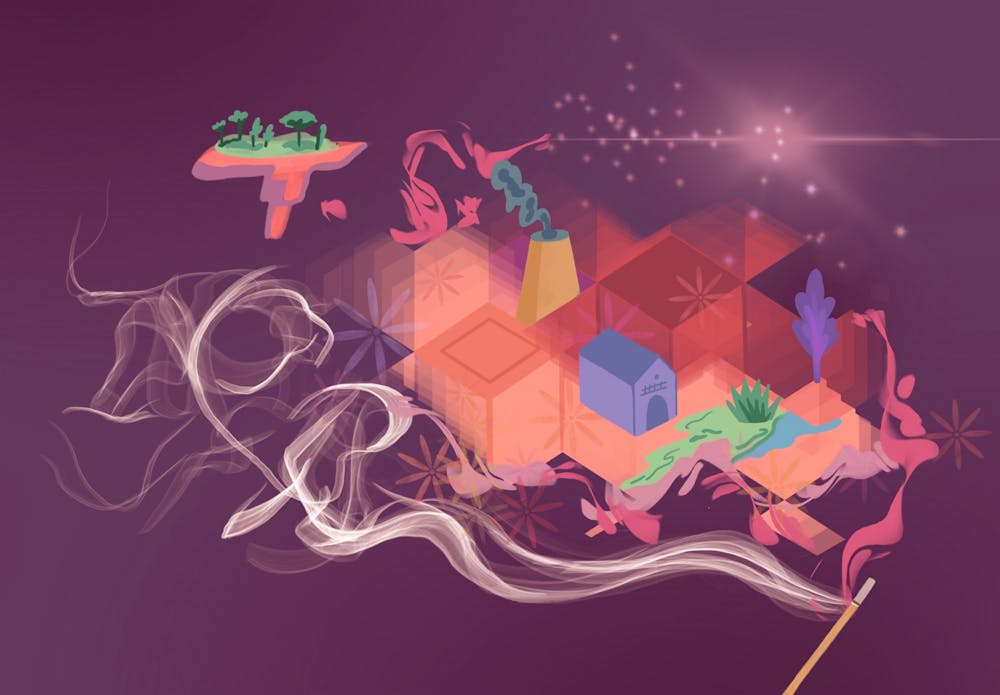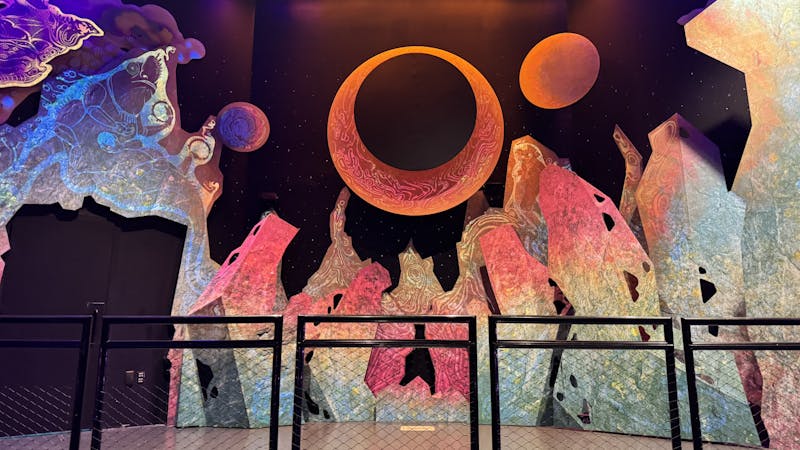New ‘Incense’ zine aims for incendiary launch

Vivian Lang / Thresher
Zines are small, independently-published works produced in either digital or physical form, and they often stress a collaborative process that brings writers, editors and readers together to work on pieces for the publication. “Incense” is Rice’s newest zine, joining the ranks of campus publications spotlighting creative works, including writing and art. According to the zine’s co-organizers, its name is meant to evoke incense’s multiple meanings: the aromatic and culturally important material and something reactionary or incendiary.
One of the zine’s co-organizers, Meghna Yennu, said that the magazine focuses on the genre of speculative fiction that encompasses supernatural, fantastical and futuristic topics, including sci-fi, fantasy, horror and utopian works. Yennu said that speculative fiction can make sharing writing more accessible to all members of the Rice community outside of English majors.
“Rice has so many different majors, especially people who are interested in interdisciplinary work, but there’s not actually a lot of outlets for people to combine both of their interests,” Yennu, a Brown College sophomore, said. “So I feel like having this magazine will help people, for example, incorporate part of their STEM classes into the sci-fi genre.”
Yennu also emphasized that the zine’s speculative fiction bent will encourage people to think about stories in a different lens than typical magazines would allow. After taking courses about speculative fiction and disability, she said that she was inspired to consider what will belong in the future.
“For example, [for] the disability class I took last semester, a lot of our readings were on disability futurity,” Yennu said. “When you imagine the future, do you imagine a world without disability? [Meaning] all disabilities must be cured, and having a disability is something that has to be normalized.”
Similarly, Incense co-organizer Cindy Han said they were inspired by BIOS 368, a course they were interested in because of its focus on connecting art with biology within the context of how some people are uncomfortable with certain art.
“You live in your mortal coil,” Han, a Lovett College junior, said. “It’s something that I find fascinating … [It] really lends itself to a creative lens because as we are developing more technologies — we want to think about what directions we want to go in and how people will react to it, even if it’s just the idea of it in a story.”
In addition to encouraging audiences to sit with uncomfortable topics, Yennu emphasized that Incense’s goal is to create a community of creatives along with the zine’s other co-organizer Maggie Ku. They said that their Discord server epitomizes this collaborative atmosphere — they have channels where artists can share inspirations, whether that is digital art, music or other stories. The work being created in this community is experimental, featuring a mix of poetry, short stories, illustrations and more.
“The most important thing I want to emphasize is that even though we are organizing it, there’s no hierarchy. It’s more of a student collective in the idea of trying to build a community,” Yennu said. “That’s why we have ways for people to share inspiration for things like through music or different pieces and artworks.”
Chloe Liebenthal, an Incense Zine contributor, said she appreciates Incense’s emphasis on collaboration and making writing accessible to people throughout the Rice community, regardless of how much experience they have.
“There are other fantastic literary publications on campus, but in terms of connecting people who maybe have never contributed to a publication like that before, what I really love about Incense is that the collaborative zine format makes it welcoming to people from all backgrounds and experiences,” Liebenthal, a McMurtry College senior, said.
While this edition will be the product of this semester’s work, Yennu and Han said they plan for next year’s zine to be a yearlong process. This would allow writers more time to move from the proposal stage to collaborating with readers and other writers to further develop their work.
“The idea is to have a generative magazine,” Yennu said. “We’re gonna work together for a specific time, basically experiment with fun things like ‘Oh, I want to experiment with parallel universes,’ and then have a final product by the end of the year.”
More from The Rice Thresher

Thresher’s guide to arts and entertainment in Houston
New to the city? Unsure how to spend your time procrastinating on homework? You’re in luck — Houston is a playground if you know where to look, and most of it is an easy metro ride or short commute from campus. Here’s a starter pack of spots that deliver fresh air, brain food and the occasional “wait, this is in Houston?” moment.

Thresher’s Lollapalooza report: Who ruled Grant Park?
Chicago’s Grant Park ran on pure dopamine this weekend — surprise debuts, late-but-worth-it arrivals, confetti, fireworks and at least three mass sing-alongs an hour. From Joey Valence & BRAE road-testing new indietronica to A$AP Rocky cracking open his vault, T-Pain turning the field into karaoke and Olivia Rodrigo summoning Weezer, Lollapalooza felt like a live-wire mixtape. Doechii built a universe, TWICE made history and Sabrina signed off with a superstar-cementing finale. Here’s what actually lived up to the skyline.
“Ginny & Georgia” Season 3: A Messy, Magnetic Villain Origin Story
I’ll admit it: I came into “Ginny & Georgia” expecting another glossy Netflix soap that looks great in a weekend binge but evaporates from memory by Monday. By the end of season three, I realized I’d been doing something I rarely do with shows like this: I was taking notes. Not on the plot (though it’s as twisty and outrageous as ever), but on the characters. I loved them. I was grinning from ear to ear watching them scheme, stumble and monologue their way through impossible situations. That’s when I knew: this show had done something right.


Please note All comments are eligible for publication by The Rice Thresher.